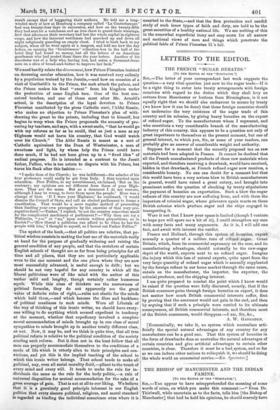LETTERS TO THE EDITOR.
THE FRENCH "SUGAR DEBATES."
[TO SUR EDITOR OF TEX "SPECTATOR:] SIR,—The letter of your correspondent last week suggests the question—a very vital question just now to the sugar trade—If it be a right thing to enter into treaty arrangements with foreign countries with regard to the duties which they shall levy on cottons from Manchester or buttons from Birmingham, is it not equally right that we should also endeavour to secure by treaty (we know how it can be done) that those foreign countries should not undermine the very existence of the sugar trade of this country and its colonies, by giving heavy bounties on the export of refined sugar. To the manufacturers whom I represent, and who constitute a very considerable branch of the manufacturing industry of this country, this appears to be a question not only of great importance to themselves at the present moment, but one of general interest, to which you, Sir, or some of your readers, can probably give an answer of considerable weight and authority.
Suppose for a moment that the recently proposed tax on raw materials had been adopted in France. It cannot be doubted that all the French manufactured products of these raw materials when exported, and therefore receiving a drawback, would have received, hidden in that drawback, as French refined sugar now receives, a considerable bounty. No one can doubt for a moment but that this would have been a very serious blow to British manufacturers in general, would have raised a great outcry, and brought into prominent notice the question of checking by treaty stipulations the payment of bounties on exportation. Such a blow the sugar refiners of this country are now suffering from, and with them the importers of colonial sugar, whose grievance again reacts on those British colonies which produce sugar and the ships engaged in transporting it.
Were it not that I know your space is limited (though I venture to hope you will spare use a bit of it), I could strengthen my case with many facts and many arguments. As it is, I will add one fact, and await with interest the verdict.
France and Holland, through this system of bounties, export annually a quarter of a million tons of refined sugar. Great Britain, which, from its commercial supremacy on the seas, and its manufacturing advantages, should naturally be the raw-sugar depot of the world, exports next to no refined sugar. Imagine the injury which this loss of natural exports, qnite apart from the very large quantity of refined sugar which is annually supplanted by the foreign refiner in our home market through the same cause, entails on the manufacturer, the importer, the exporter, the colonial producer, and the shipping interest.
I am quite prepared to combat the point which I know would be raised if the question were fully discussed, namely, that if the British consumer gains through foreign bounties on export, it does not matter how much British commercial interests suffer, first by proving that the consumer would not gain in the end, and then by arguing that if such a principle were carried to its ultimate consequences, all British commercial interests, and therefore most of the British consumers, would disappear.—I am, Sir, &c., A. W. GADESDEN.
[Economically, we take it, no system which neutralises arti- ficially the special natural advantages of any country for any manufacture can be a good one. That this system of bounties in the form of drawbacks does so neutralise the natural advantages of certain countries and give artificial advantages to certain other countries, is clear. Therefore it must be a bad system, and so far as we can induce other nations to relinquish it, we should be doing the whole world an economical service.—ED. Spectator.]


































 Previous page
Previous page